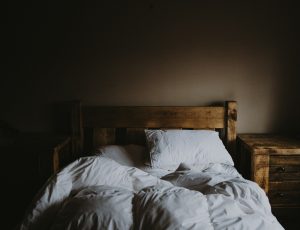Sleep is something everybody needs and Sleep is often one of the first things that is affected when we feel stressed, anxious or depressed or a change in routine. It plays a vital role in both our physical and mental health. Lack of sleep can lead to physical illness and increase your risk of heart disease. Mentally, not getting enough sleep can lead to anxiety and can make it hard for you to concentrate.
Sleeping problems such as not sleeping, laying awake at night, waking too early, waking during the night , unable to switch off, maybe you are sleeping too much and finding it difficult to wake up, perhaps feelings groggy and tired despite having slept for a long time.
Fortunately, sleep is som ething that can be greatly improved by hypnotherapy. Hypnotherapy can help you learn how to relax and go to sleep, and stay asleep, to calm down the part of your mind that is wide awake and worrying during the night when you are trying to sleep, it will also help to regulate your sleep patterns.
ething that can be greatly improved by hypnotherapy. Hypnotherapy can help you learn how to relax and go to sleep, and stay asleep, to calm down the part of your mind that is wide awake and worrying during the night when you are trying to sleep, it will also help to regulate your sleep patterns.
There is an interesting article by The Sleep Foundation covering sleep during COVID – 19, full detail by clicking this link. https://www.sleepfoundation.org/sleep-guidelines-covid-19-isolation, however, here is some of the important information from within the article! It’s a little longer than my normal blogs but I feel its worth the read, see what you think!
Why is Sleep Important During a Pandemic?
Sleep is a critical biological process, and the truth is that it’s always important. When confronting the COVID-19 pandemic, though, sleep becomes even more essential because of its wide-ranging benefits for physical and mental health.
• Sleep empowers an effective immune system. Solid nightly rest strengthens our body’s defences, and studies have even found that lack of sleep can make some vaccines less effective.
• Sleep heightens brain function. Our mind works better when we get good sleep, contributing to complex thinking, learning, memory, and decision-making. For adults and children adapting to work and school at home, good sleep can help them stay sharp.
• Sleep enhances mood. Lack of sleep can make a person irritable, drag down their energy level, and cause or worsen feelings of depression.
• Sleep improves mental health. Besides depression, studies have found that a lack of sleep is linked with mental health conditions like anxiety disorder, bipolar disorder, and Post-Traumatic Stress Disorder (PTSD).
Experts agree that getting consistent, high-quality sleep improves virtually all aspects of health, which is why it is worthy of our attention during the coronavirus pandemic. 
Our Guidelines to Sleeping Well During the COVID-19 Outbreak
In spite of the daunting challenges, there are a handful of steps that can promote better sleep during the coronavirus pandemic.
If these efforts don’t pay off immediately, don’t give up. It can take time to stabilize your sleep, and you may find that you need to adapt these suggestions to best fit your specific situation.
Set Your Schedule and Routine
Establishing a routine can facilitate a sense of normalcy even in abnormal times. It’s easier for your mind and body to acclimate to a consistent sleep schedule, which is why health experts have long recommended avoiding major variation in your daily sleep times.
Sleep-specific aspects of your daily schedule should include:
• Wake-Up Time: Set your alarm, bypass the snooze button, and have a fixed time to get every day started.
• Wind-Down Time: This is an important time to relax and get ready for bed. It can involve things like light reading, stretching, and meditating along with preparations for bed like putting on pyjamas and brushing your teeth. Given the stress of the coronavirus pandemic, it’s wise to give yourself extra wind-down time each night.
• Bedtime: Pick a consistent time to actually turn out the lights and try to fall asleep.
• Of course don’t forget to listen to your MP3 music file I sent you if you are a client of mine just before you go to sleep !
In addition to time spent sleeping and getting ready for bed, it can be helpful to incorporate steady routines to provide time cues throughout the day, including:
• Showering and getting dressed even if you aren’t leaving the house.
• Eating meals at the same time each day.
• Blocking off specific time periods for work and exercise.
Reserve Your Bed For Sleep
Sleep experts emphasize the importance of creating an association in your mind between your bed and sleep. For this reason, they recommend that sleep and sex be the only activities that take place in your bed.
This means that working-from-home shouldn’t be working-from-bed. It also means avoiding bringing a laptop into bed to watch a movie or series.
On any given night, if you find that you’re having a hard time sleeping, don’t spend more than 20 minutes tossing and turning. Instead, get out of bed and do something relaxing in very low light, and then head back to bed to try to fall asleep.
Frequently changing your sheets, fluffing your pillows, and making your bed can keep your bed feeling fresh, creating a comfortable and inviting setting to doze off.
See the Light
Exposure to light plays a crucial role in helping our bodies regulate sleep in a healthy way. As you deal with disruptions to daily life, you may need to take steps so that light-based cues have a positive effect on your circadian rhythm.
• If you can, spend some time outside in natural light. Even if the sun isn’t shining brightly, natural light still has positive effects on circadian rhythm. Many people find outdoor time is most beneficial in the morning, and as an added bonus, it’s an opportunity to get fresh air.
• As much as possible, open windows and blinds to let light into your home during the day.
• Be mindful of screen time. The blue light produced by electronic devices, such as mobile phones, tablets, and computers, has been found to interfere with the body’s natural sleep-promoting processes. As much as possible, avoid using these devices for an hour before bed. You can also use device settings or special apps that reduce or filter blue light.
Be Careful with Naps
If you’re home all day, you may be tempted to take more naps. While a short power nap early in the afternoon can be useful to some people, it’s best to avoid long naps or naps later in the day that can hinder night time sleep.
Stay Active
It’s easy to overlook exercise with everything happening in the world, but regular daily activity has numerous important benefits, including for sleep.
If you can go for a walk while maintaining a safe distance from other people, that’s a great option. If not, there is a wealth of resources online for all types and levels of exercise. Many gyms and yoga and dance studios are live-streaming free classes during this period of social distancing.
Practice Kindness and Foster Connection
It might not seem critical to your sleep, but kindness and connection can reduce stress and its harmful effects on mood and sleep.
Despite all the bad news that you may come across, try to find some positive stories, such as how people are supporting one another through the pandemic. You can use technology to stay in touch with friends and family so that you can maintain social connections despite the need for social distancing.
Utilize Relaxation Techniques
Finding ways to relax can be a potent tool in improving your sleep. This includes listening to your MP3 file !, deep breathing, stretching, yoga, mindfulness meditation, calming music, and quiet reading are just a few examples of relaxation techniques that you can build into your routines. If you’re not sure where to get started, check out smartphone apps like Headspace and Calm that have programs designed for people new to meditation.
Another relaxation strategy during this pandemic is to avoid becoming overwhelmed by coronavirus-related news. For example, you can try techniques including:
• Bookmarking one or two trusted news sites and visiting them only during a limited, pre-set amount of time each day.
• Cutting down the total time that you spend scrolling on social media. If you want a hand in this effort, a number of apps can monitor and even block your time on social media sites or apps each day.
• Scheduling phone or video calls with friends and family and agreeing in advance to focus on topics other than the coronavirus.
Watch What You Eat and Drink
Keeping a healthy diet can promote good sleep. In particular, be cautious with the intake of alcohol and caffeine, especially later in the day, as both can disrupt the quantity and quality of your sleep.
Contact Your Doctor if Necessary
If you have severe or worsening sleep or other health problems, it is advisable to be in touch with your doctor. Many doctors are increasing availability via email or telemedicine to allow patients to discuss concerns without having to physically visit their office.
Trusted Resources About COVID-19
With news about the novel coronavirus moving at a mile-a-minute, it’s important to have resources for trusted, evidence-based information. Two such sources include the World Health Organization (WHO) and the U.S. Centers for Disease Control and Prevention (CDC). Their sites offer key information about COVID-19 including how to keep your family and community safe and how to avoid coronavirus myths
https://www.sleepfoundation.org/sleep-guidelines-covid-19-isolation for the full article.
